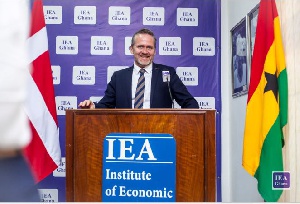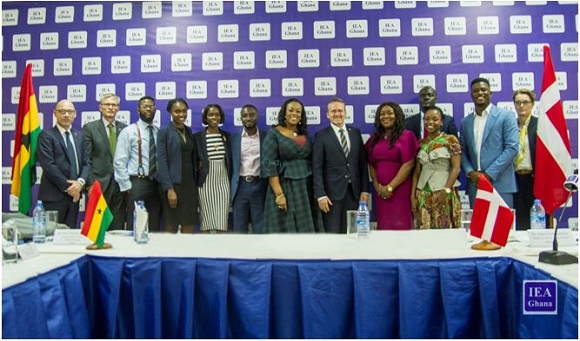 The Danish Foreign Minister, Anders Samuelsen delivering his speech at the IEA
The Danish Foreign Minister, Anders Samuelsen delivering his speech at the IEA
The Institute of Economic Affairs (IEA) on Friday November 24, 2017 hosted Anders Samuelsen, the Danish Foreign Minister.
He was accompanied by Ms. Susanne Hyldelund (Danish Secretary of State), Mr. Anders Kaldan Helstrand (Private Secretary), Mr. Peter Eilschow Olesen (Deputy Head of Mission, Danish Embassy, Accra and Ms. Anne Moller Ege, (Press Advisor).
Welcoming the guests to the Institute, Dr. Charles Mensa, Board Chairman of the IEA said the purpose of the meeting was to create a platform for promising young entrepreneurs to engage the Danish Foreign Minister on the prospects and challenges of entrepreneurship in Ghana.
He also observed that President Nana Addo Dankwa Akufo-Addo’s vision of “Africa Beyond Aid” was tied with Denmark’s policy of “aid to trade.”
“However, in our humble view, this vision of ours and the Danish policy can be very successful if Ghana is able trade value added products or manufactured goods and services, using our abundant labour and with proper guidance and support for technical partnerships, these young people can create the new Africa that we all aspire to see. The Africa that adds value to its resources creates more jobs for its young people,” he said.
Speaking at the event, the Danish Foreign Minister, Anders Samuelsen said Ghana’s quest to develop its economy beyond aid depends highly on empowering its entrepreneurs to grow and expand their businesses.
According to Mr. Samuelsen who is on a two-day visit to Ghana with the Queen of Denmark, an expanded economy built on the back of entrepreneurs would create more jobs for unemployed young people.
“The future belongs to you. You are your country’s young population and entrepreneurship is in you. Entrepreneurship creates unique opportunities to create something special that can lead to economic growth, job creation and solve problems of your country. You are those creating the future. It takes a lot of resilience,” he said.
During the one-hour interaction, the participants shared their challenges which included the lack of skilled personnel, financial support, lack of training and the current educational system that is disconnected from the needs of industry.
Coming from a country considered to be highly business friendly, Mr. Samuelsen said it was inspiring to meet promising young entrepreneurs with great spirits to change things around them as well as to create businesses that meet the needs of society.
“What we have been able to do in Denmark is to make it very easy to start a new business. We have more or less everything online such that you can easily register your businesses without difficulties,” he added.

Denmark’s entrepreneurial ecosystem is one that promotes young businesses through capacity building and financial support. For instance, the country’s innovation Fund Denmark annually selects young entrepreneurs whose business ideas receive coaching and funding to become growth companies.
Innovation Fund Denmark invests in the development of new research-based knowledge and technology creating growth and employment in Denmark. The Fund provides risk capital that enables innovation and partnerships, where companies, universities and public authorities work together on challenges facing society today.
With Denmark pushing to shift the paradigm of its economic ties with Ghana from aid to trade, Mr. Samuelsen said the Ghanaian government’s vision could transit the country from aid to trade; which meant new businesses from Ghanaian and Danish investors.
Danish support for Ghana over the last 30 years through its aid agency, DANIDA, covers areas including good governance, skills development, rural finance and business advocacy.
Contributing to the discussions, Mr. Amfo-Akonnor, owner and chef at Biishville, a restaurant observed that Ghana’s educational system was full of theory and lacked practical training that would awaken the spirit of entrepreneurship among young people.
Ms. Israella Mansu , the founder and CEO of Mansuki Ghana Limited, a cosmetic company, in making a case for capacity building for young entrepreneurs stated that, a training programme she attended in the United States and organised by the US Department of State changed the fortune of her GHC300 start-up to one worth more than GHC1 million today.
For his part, Mr Alex Adjei Bram, the Co-founder and CEO of Hubtel Limited, a mobile and internet value added service (VAS) provider, said the way forward to growing entrepreneurship in Ghana was to provide an enabling environment. One that taxes did not stifle growth but entrepreneurs were supported to expand and employ others.
In attendance were young entrepreneurs who cut across various sectors including; technology start-ups, cosmetics, food and beverage, cloth designs, shoe making, furniture, water provision and lifestyle products.]
A Group Picture of the Young Entrepreneurs and the Danish Foreign Minister and his team